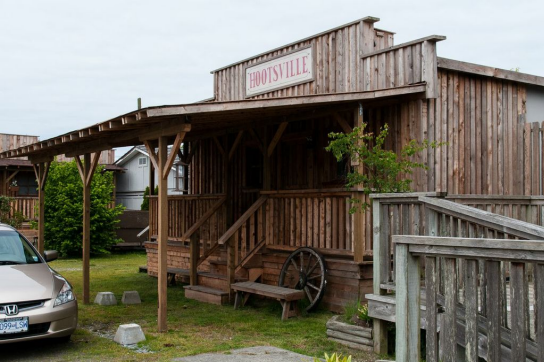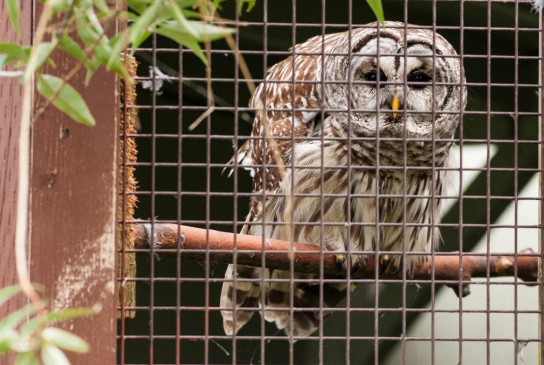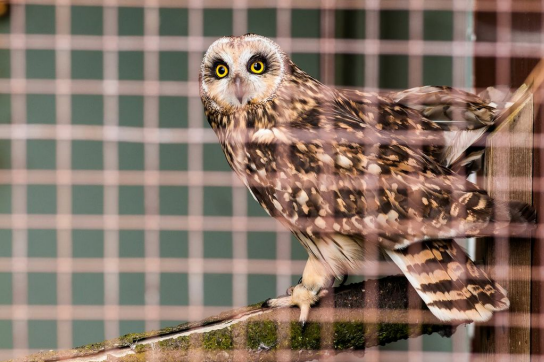By Griffy Vigneron (The Cascade) – Email
Print Edition: June 5, 2013
From two half-lidded eyes, Sarah watches visitors come and go. In her perfect stillness, she fades unnoticed into the backdrop. Her silence is smothered in a room of bustling people. Across the hall, staff hurry a few orphans into the medical room. A few volunteers sit chatting, waiting for directions. Off to one side a white board displays a large list of current residents.
Some residents are permanent, but many will recover.
All of them are birds.
It is when Sarah closes her eyes and snuggles into her feathers that her presence really becomes known. Sarah is a barn owl. Her feathers have an orange hue, and her big black eyes are circled by a rim of dark feathers. She is one of a few permanent residents of OWL, the orphaned wildlife rehabilitation society.
Down a worn country road, OWL sits alongside the ocean on five acres of peaceful Delta countryside, just outside BC’s luscious rainforests. OWL’s mission is to take in injured and orphaned birds of prey, rehabilitate and release them. Over 400 birds typically go through the facility every year.
In the medical room, head bird supervisor Rob Hope oversees the care of two new orphaned arrivals. A volunteer holds each of the orphans in turn, firmly but gently. Care is taken to make sure each bird’s head is covered, keeping them calm. The birds are weighed and checked for broken bones.
Both orphans are baby barn owls. Their most likely fate being scooped up by coyotes, they have instead been rescued and brought to OWL.
But orphans aren’t the only thing rescued by OWL.
“We get everything from broken bones, to electrocutions, to head traumas, to poisoning. We pretty well get everything and anything you can think of, human-caused,” Hope explains.
Outside behind the main office, high school volunteer Rachael Ransom is hand feeding Tyra, a merlin falcon. Because Tyra needed a partial wing amputation, she can no longer fly and has become a permanent resident. While Tyra gorges herself, eyeing onlookers warily, Ransom explains the steps birds go through for rehabilitation.
Depending on the injury, birds may start in intensive care. Their medical needs are looked after. Broken bones are pinned if need be. In severe cases, wings may be amputated. Once the birds are doing better, they can be kept in outdoor enclosures. When the birds have healed up, their flight and hunting abilities are tested to see if they will be okay to release again.
“[Then] we wait for the bander to come in. Once he bands them, we drive them out. We bring them back to where we found them,” Ransom says.
At all points, volunteers are careful not to get the birds too familiar with humans. They’re still wild animals. Because of that, most of OWL’s birds are usually off display. However, guests can have tours of the permanent birds, who are familiarized with humans.
Colin Iverson also came to volunteer after the arts council he volunteered with closed down. He runs through a tour of the facility’s permanent birds, chatting about their personality quirks, explaining how many of them came to be at the facility.
Since the permanent birds are more exposed to people, OWL often brings them on educational tours around the community.
“I took him out yesterday to Port Moody there,” Iverson says fondly of James, one of the permanent birds. “He just sits there and falls asleep on your arm, [all] cuddled up.”
In the coming future, OWL will have to move in order to facilitate the number of injured and orphaned birds that come in every year. The move is also greatly needed because the current facility is prone to flooding. They have lined up property that is already equipped with buildings and double the land. However, it will still take some time to carefully move all the birds that OWL so conscientiously looks after.




